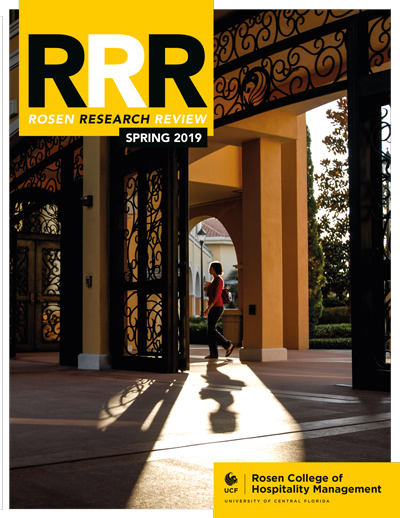Rosen Research Review: The Role of Hospitality Service Quality in Third Places for The Elderly
 As a result of the ageing baby-boomer generation and increasing average life expectancy, the active elderly is a growing population who enjoy their later lives. In order to support these individuals, it is essential to provide appropriate housing and services. In addition to the provision of these resources, it is also important that these are of a high quality in order to adequately meet resident needs. Dr. Denver Severt and Dr. Ji-Eun Lee from Rosen College of Hospitality Management have explored the role of hospitality service quality in a Continuing Care Retirement Community (CCRC) setting.
As a result of the ageing baby-boomer generation and increasing average life expectancy, the active elderly is a growing population who enjoy their later lives. In order to support these individuals, it is essential to provide appropriate housing and services. In addition to the provision of these resources, it is also important that these are of a high quality in order to adequately meet resident needs. Dr. Denver Severt and Dr. Ji-Eun Lee from Rosen College of Hospitality Management have explored the role of hospitality service quality in a Continuing Care Retirement Community (CCRC) setting.
The US Department of Health and Human Services (HHS) estimates that nearly 70% of the elderly will require some form of long- term care, including appropriate housing types and supportive care services in senior health care communities. One type of senior housing facilities and care community is a Continuing Care Retirement Community (CCRC), which represents a hybrid of hospitality and health care services. CCRCs provide a number of services, including onsite pharmacy, insurance billing, bank, swimming pool, health/wellness program, fitness area, beauty or barber shop, onsite nursing/physicians, physical therapy, water aerobics, paint classes, transportation to events, additional meals, transportation, recreational therapy, onsite counselling, as well as home health care. These are long-term life-care communities that also act as a home for residents.
Previous studies have attempted to measure service quality and food quality in CCRCs, proposing structure, process, and outcome as important variables in assessing quality of care and service delivery. However, in addition to hospitality and service quality, the long- term nature of the relationship of the elderly residents with their CCRC is also significant. In particular, the perception of a CCRC as a suitable ‘third place’ is important. Third places are defined as “public places that host the regular, voluntary, informal and happily anticipated gatherings of individuals beyond the realms of home and work.”
According to the relational third=place theory framework proposed by Rosenbaum, older consumers develop meanings related to a particular place based on their ability to satisfy consumption, such as food, prices, ambient conditions and layout of the place, as well as social and emotional needs through companionship and support. Perceived deeper meanings of the place exist and can be categorized as place-as-practical, place-as-gathering, or place-as-home. The perceived meanings of the place influence an individual’s loyalty to it.
Photo: GagliardiPhotography/Shutterstock.com
THE IMPORTANCE OF THIRD SPACES FOR THE ELDERLY
Elderly people often experience loneliness as a result of losing a family member, a family unit or a divorce. These feelings can also be brought about by physical illness or a diminished social group. These circumstances exacerbate the need for third-place relationships to be established and these are sought out by the elderly, either consciously or unconsciously.
Research has shown that individuals who do find supportive relationships within these communities obtain greater health and longevity. For elderly people in CCRCs, the role of the third space might be particularly important as a result of the enhanced vulnerability, loss of freedom, and increasingly compromised health, on top of the loneliness they are already experiencing. There is therefore a need for the provision of physical, instrumental and emotional support within CCRCs so that these individuals are able to have all of their needs met within one place. Dr. Denver Severt and Dr. Ji-Eun Lee thus sought to explore how hospitality and service quality relate to third- place components of the relational third-place theory and residential loyalty.
If residents’ experiences within a CCRC greatly exceeds their expectations, they will be highly satisfied and likely to share their experience with others. As individuals tend to stay in CCRCs on a long-term basis, they consider these places as a final residence. High levels of satisfaction and positive word of mouth is thus trustworthy information for potential future residents and their families. Based upon these ideas, Severt and Lee proposed two key hypotheses in their research: resident needs (physical, instrumental, and emotionally supportive resources) positively influence overall place meaning in a CCRC and residents’ perceived place meaning positively influences loyalty outcomes in a CCRC.
EXPLORING THE CCRC AS A THIRD PLACE
Severt and Lee conducted their research within a CCRC of more than 300 residents in four different types of communities, including residential, apartment, assisted living and nursing home, located within the Southeast of the US. Surveys were sent to just under 300 individuals who had been defined as having sufficient cognitive competence, health and energy to participate. The survey measured three different components. The first was how the CCRC was performing in terms of meeting residents’ physical, instrumental and emotional needs. The second was how residents felt about the CCRC as a place-as-practical, -gathering and -home. The final aspect was how satisfied they were with their experience in the CCRC.
Of the surveys distributed, 157 were completed, representing a response rate of 54%. The majority of participants were female (66%) and were aged between 61 and 106 years. Most of the sample were white (98%) and were staying in the residential and apartment classification of the CCRC (82%). The vast majority of participants had lived there for over a year.
Results showed that the components of hospitality service quality in CCRCs (physical, instrumental and emotional support) strongly influenced residents’ perceived meaning of place. This suggests that residents seek and find compensation for the loss of social and emotional support from their lives in the CCRC. A high level of satisfaction with the provision of these forms of support leads to a strong formation of place meaning, that is, place-as-practical, place-as-gathering, and place-as-home, in line with the relational third-place theory.
Findings also highlighted that physically, clean facilities are an essential element within hospitality service. In addition to physical support, there are a number of aspects that are vital within CCRC settings, including reliable delivery of promised services, empathetic community environment as well as knowing and caring for the individualized needs of residents. Environments rich in these attributes reduce social and emotional loneliness felt by residents, facilitating the ability to live active lives. Conversely, environments which do not provide these attributes can lead to depression and inactivity for individuals.
There are a number of industry implications of these findings. There is clearly a need to establish a culture within the industry based upon hospitality and service. This can be achieved in three key ways. The first of these is to design programs and resources that meet third-place needs, which will aid in the development of positive emotions, which are hugely important within a CCRC. This will also provide social and emotional support through staff and other residents within the CCRC. The increased social engagement will enhance resident health and longevity. Secondly, there is a need for programs that
aid in the transition from third places to community places. It is important to consider the unmet needs of different residents and offer them a range of third-place substitutes. This can only be achieved by getting to know these individuals on a deep level. Thirdly, if management conceptualized the home and third place as converging into one place in the lives of residents, it may positively influence the entire culture of a CCRC. Through concerted efforts to maintain a hybrid of a third place while also having the trust and comfort of home, resident experiences can be optimized.
 Denver Severt, Ph.D., has had 25 years’ experience in all phases of the restaurant industry from front-line service positions to general manager positions. Denver teaches guest services management, managerial accounting, and financial accounting for the UCF Rosen College of Hospitality Management. Denver’s research interests involve linking customer and employee satisfaction programs.
Denver Severt, Ph.D., has had 25 years’ experience in all phases of the restaurant industry from front-line service positions to general manager positions. Denver teaches guest services management, managerial accounting, and financial accounting for the UCF Rosen College of Hospitality Management. Denver’s research interests involve linking customer and employee satisfaction programs.
A: 9907 Universal Blvd, Orlando, FL 32819
E: Denver.Severt@ucf.edu T: +1 (407) 903 8036
W: www.hospitality.ucf.edu
 Ji-Eun Lee, Ph.D., received her doctorate from Purdue University. Her research interests include hospitality service management and organizational behavior.
Ji-Eun Lee, Ph.D., received her doctorate from Purdue University. Her research interests include hospitality service management and organizational behavior.
T: +1 765-586-8803
Researchers in Focus
Research Objectives
This research examines CCRCs from a hospitality perspective to shed light on the important factors for residents’ wellbeing.
References
Key paper
Lee, J. E., & Severt, D. (2017). The role of hospitality service quality in third places for the elderly: An exploratory study. Cornell Hospitality Quarterly, 58(2), 214-221.
Personal Response
What inspired you to apply hospitality theory to a retirement context?
Vulnerable groups, such as individuals in senior living, are susceptible to many wrongs. Doing the least harm possible means promoting a culture of hospitality and service excellence. In negative service arenas such as retirement communities, no one truly wants to find themselves there. However, when they inevitably go to these communities, it is essential to find one that understands the community as the home – a safe space – of all residents. In this way, hospitality should be right at home in these communities. Additionally, investors in these expanding developments readily acknowledge that a culture that is hospitable is a strategic advantage.




